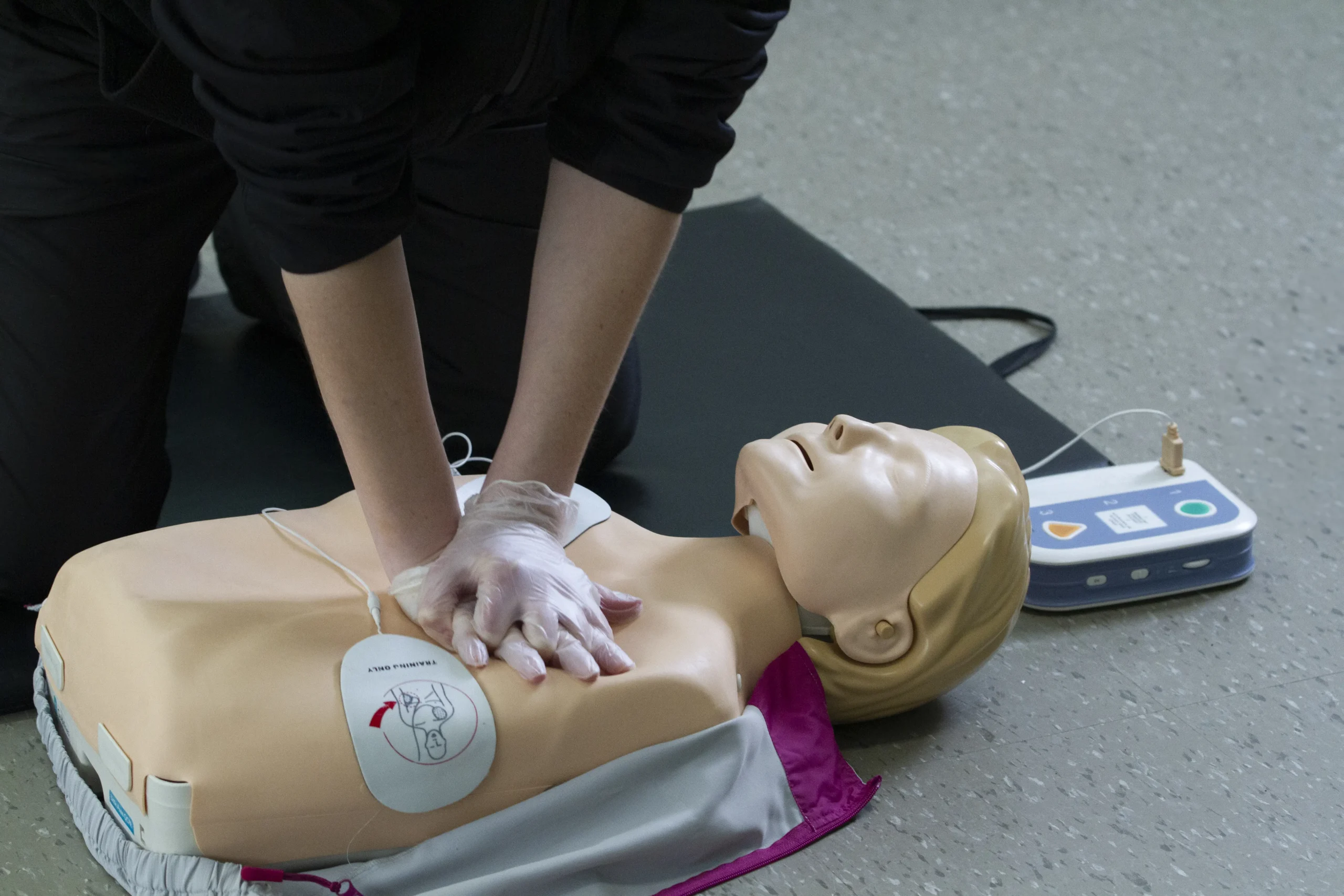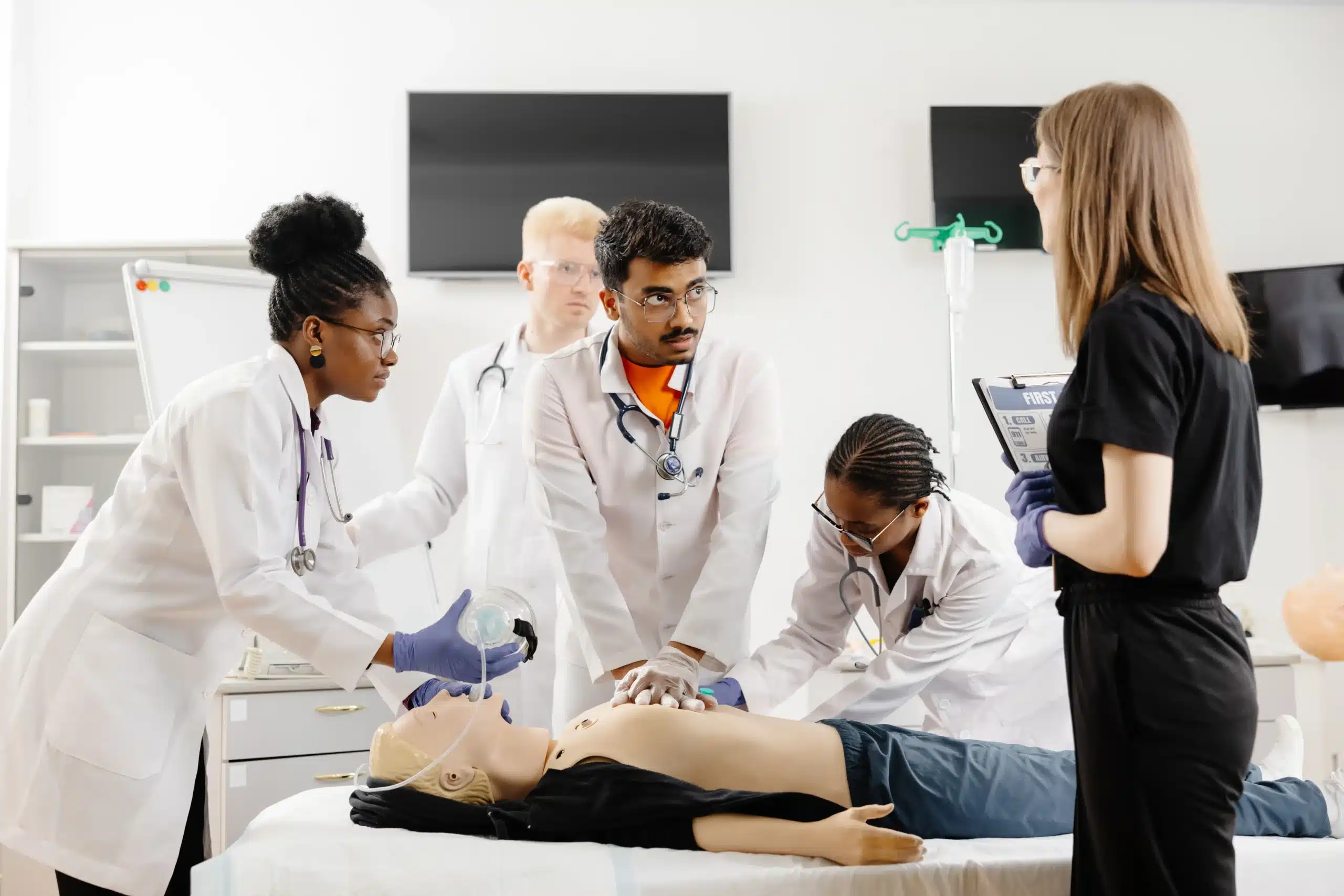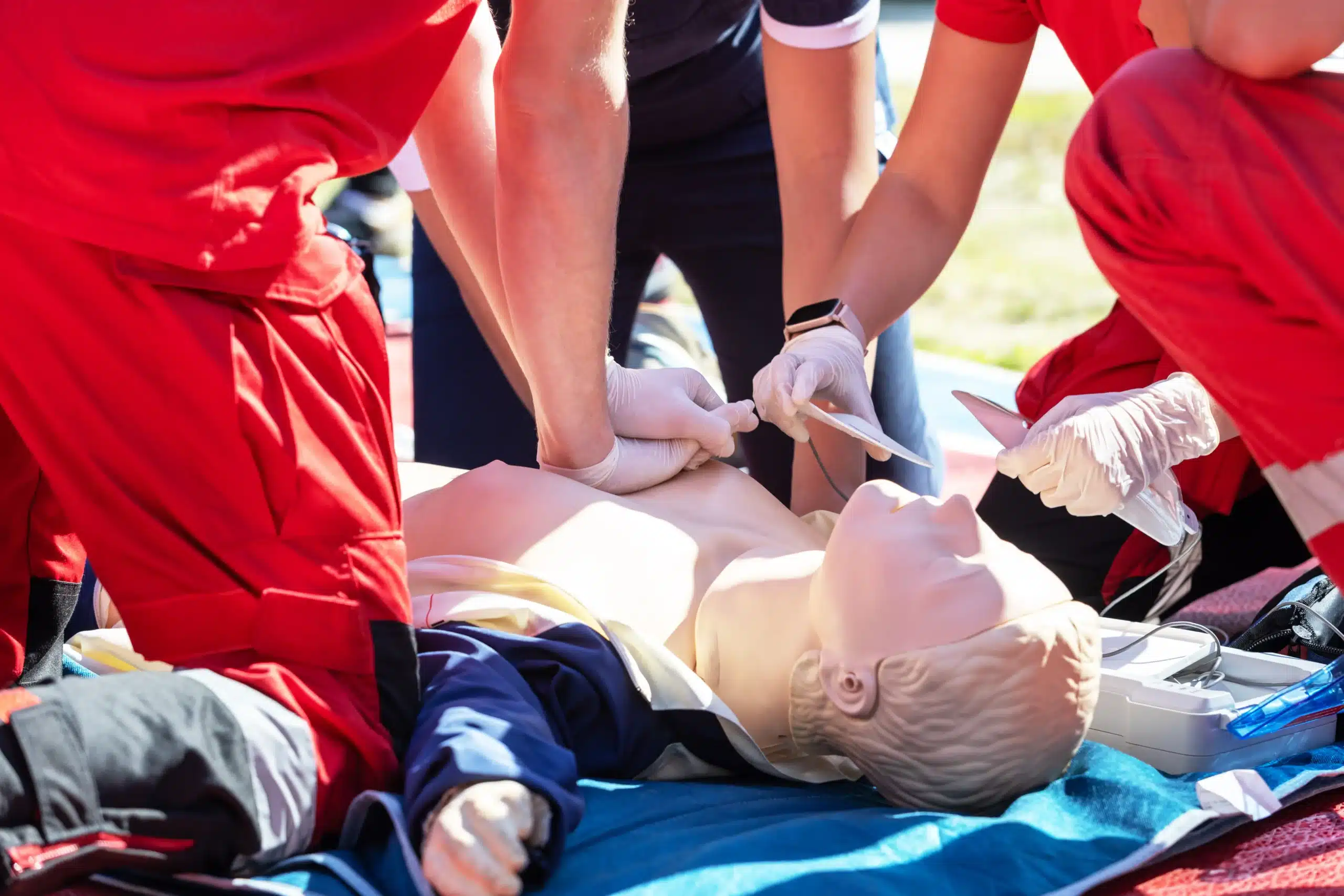Finding an OSHA-approved BLS certification course that fits your schedule and budget can feel like searching for a needle in a haystack. So many options, so many acronyms (BLS, CPR, AED…help!), and let’s not even talk about the cost. Take a deep breath—we’re here to simplify things. This guide is your one-stop shop for understanding BLS certification, from the basics of what it covers to navigating OSHA requirements and debunking common myths. We’ll also explore the top BLS certification providers, compare course content, and give you practical tips for choosing the right course for your needs. As a local business committed to providing affordable, high-quality training in Sacramento, we’re passionate about empowering individuals with the life-saving skills they need to make a difference.
Key Takeaways
- BLS certification empowers you to respond to medical emergencies and is often a workplace requirement. Find a reputable training provider and learn essential skills like CPR, AED use, and airway management.
- Consider factors like cost, course content, and provider reputation when selecting a BLS course. Look for comprehensive training and hands-on practice to build confidence and proficiency. Safety Training Seminars offers affordable, high-quality BLS certification in the Sacramento area.
- Maintain your BLS skills and knowledge by renewing your certification every two years. Staying current ensures you’re always prepared to handle emergencies effectively and contribute to a safer workplace.
What is OSHA-Approved BLS Certification?
What is BLS Certification & Why is it Important?
Basic Life Support (BLS) certification equips people with the skills to respond to medical emergencies. It focuses on providing immediate care during life-threatening situations such as cardiac arrest or respiratory failure. BLS-certified individuals can perform CPR, use an AED, and relieve airway obstructions. This immediate intervention can significantly improve the chances of survival while waiting for professional medical help. For many healthcare professionals, BLS certification is a job requirement.
OSHA’s Role in Workplace Safety
The Occupational Safety and Health Administration (OSHA) plays a vital role in ensuring workplace safety. While OSHA doesn’t offer its own BLS certification program, it emphasizes the importance of having trained BLS providers in workplaces. OSHA requires employers to ensure their employees have access to a person trained to render first aid. This often translates to requiring BLS certification for certain roles, especially in healthcare settings. Meeting these requirements helps create a safer work environment and demonstrates a commitment to employee well-being.
Key BLS Training Components
BLS certification courses cover essential life-saving techniques. You’ll learn how to perform high-quality CPR for adults, children, and infants, including how to use an automated external defibrillator (AED). Training also covers basic airway management techniques to help someone who is choking or having difficulty breathing. These skills are practiced through hands-on training and simulations, ensuring you feel confident using them in a real emergency. Our BLS certification course covers all of these key components.
Common BLS Certification Misconceptions
There are several misconceptions surrounding BLS certification. One common myth is that it’s only for doctors and nurses. In reality, BLS certification is valuable for anyone working in healthcare, education, childcare, or other fields where medical emergencies could occur. Another misconception is that it’s too time-consuming. While comprehensive, BLS courses are designed to be efficient and manageable, fitting into busy schedules. Finally, some believe BLS isn’t necessary if you already have CPR training. BLS certification goes beyond basic CPR, covering a broader range of skills and providing more in-depth training. It’s a worthwhile investment for anyone wanting to be prepared for a medical emergency. Learn more about our low price guarantee.
Top BLS Certification Providers & Course Content
Finding the right BLS certification course boils down to a few key factors: a reputable provider, comprehensive content, and—let’s be honest—cost. This section breaks down some of the top BLS providers and what they offer so you can make an informed decision.
American Heart Association (AHA)
The AHA is a giant in the field, known for developing the science-backed guidelines many other courses base their training on. Their BLS courses are highly respected and widely accepted. They offer various learning formats, including blended learning (online coursework combined with in-person skills sessions).
American Red Cross
The American Red Cross is another well-known and trusted provider. Their BLS certification meets OSHA requirements and is valid for two years. Like the AHA, they offer both in-person and blended learning options, giving you flexibility in how you learn.
Safety Training Seminars
Safety Training Seminars focuses on providing affordable, high-quality BLS training right here in Sacramento. They offer a low-price guarantee and cover all the essential BLS skills. If you’re local to Sacramento, Roseville, or Rocklin, their courses are worth checking out. They offer several certifications, including AHA BLS, ACLS, and EMSA Child Care Health & Safety. For those needing to renew their skills, they also offer RQI classes.
National Safety Council (NSC)
The NSC offers a range of safety training programs, including BLS certification. Their courses cover essential life-saving skills and are a solid option for those seeking a nationally recognized certification.
Health & Safety Institute (HSI)
HSI provides comprehensive BLS training, focusing on the core skills needed for effective emergency response. They emphasize practical application and offer various course formats to fit different learning styles.
Course Requirements & Skills Taught
Regardless of the provider you choose, certain core skills are universally covered in BLS certification courses. These include:
CPR Techniques & AED Use
You’ll learn how to perform high-quality CPR for adults, children, and infants. The course also covers how to recognize the signs of cardiac arrest and properly use an automated external defibrillator (AED).
First Aid Basics & Emergency Response
BLS training typically includes basic first aid principles, such as how to control bleeding, manage choking, and respond to other common medical emergencies.
Hands-on Practice & Skill Assessment
A crucial component of any good BLS course is hands-on practice. You’ll have the opportunity to practice your skills on mannequins and participate in simulated scenarios to build confidence and proficiency. Most courses include a skills assessment to ensure you’ve mastered the techniques before receiving your certification.
BLS Certification: Process & Costs
Getting BLS certified is straightforward. Here’s what you can expect regarding costs, time commitment, and keeping your certification current. Knowing these details upfront makes planning easier and helps you find the right course.
Average Pricing & Cost Factors
BLS certification costs vary depending on the training provider and location. While some organizations offer basic life support certification for around $70, more affordable options exist. At Safety Training Seminars, our BLS for Healthcare Providers certification class is just $60, including CPR, AED use, and first aid training. We’re committed to offering the lowest prices in Sacramento County.
Course Duration & Scheduling
A typical BLS Provider course takes about 4.5 hours, covering skills practice and testing. Renewal courses are generally shorter, around 2.5 hours. Safety Training Seminars offers various course times—weekday, weeknight, and weekend options—to accommodate busy schedules. Check our website for the latest schedule.
Certification Validity & Renewal
BLS certification is valid for two years. To maintain your skills and stay up-to-date, renew your certification before it expires. This ensures you’re always prepared for emergencies. Safety Training Seminars offers streamlined renewal courses to make this process easy.
Discounts & Promotions
We frequently offer discounts and promotions on BLS certification courses. Check our website or contact us for current deals and to learn more about our low price guarantee. We believe cost shouldn’t prevent anyone from learning these essential skills.
Who Needs BLS Certification?
BLS certification equips people with the skills to respond effectively to medical emergencies. But who exactly needs this training? While it’s a good idea for everyone, certain professions often require it. Let’s explore some key sectors where BLS certification is essential.
Healthcare Professionals
BLS certification is crucial for professionals who might face medical emergencies on the job. This includes doctors, nurses, paramedics, and other healthcare providers who must be prepared to act quickly and efficiently in critical situations. These professionals are often the first line of defense in medical crises, making their BLS skills essential for positive patient outcomes. From administering CPR to using an AED, their training can truly make a difference.
Dental Professionals
Dental professionals also need BLS certification to handle medical emergencies that can occur during procedures. A patient could experience a sudden medical issue while in the dentist’s chair. Having trained professionals on hand to provide immediate care is critical. BLS training ensures dental offices are prepared to manage these situations and keep their patients safe.
Education Sector
Teachers, school nurses, and other staff members in the education sector benefit greatly from BLS certification. Children can experience unexpected medical events at school, from allergic reactions to injuries on the playground. BLS training empowers educators to respond swiftly and confidently, providing immediate care until professional medical help arrives.
Fitness and Recreation
Fitness trainers, lifeguards, and other recreation staff often work in environments where medical emergencies can happen. From sudden cardiac events during workouts to accidents near water, these professionals need to be prepared. BLS certification gives them the skills to handle these situations effectively, ensuring the safety of those in their care.
Industrial & Construction Workers
Industrial and construction sites present unique safety risks, making BLS certification vital. Accidents can, and do, happen. Having personnel trained in BLS can be crucial in providing immediate care while waiting for emergency medical services. This rapid response can significantly improve outcomes in these high-risk environments.
Get the Most Out of Your BLS Certification
BLS certification is more than just a credential—it’s an investment in yourself, your workplace, and your community. Let’s explore how you can maximize the benefits of your BLS training.
Benefits for Employees & Employers
Basic Life Support (BLS) certification equips individuals with crucial life-saving skills applicable in various emergencies. For employees, BLS training provides the confidence and competence to respond effectively during medical crises, potentially saving lives. This creates a safer work environment for everyone. Employers also benefit from a workforce trained in BLS. A prepared team can minimize workplace incidents and build a culture of safety. Plus, having BLS-certified employees can fulfill regulatory requirements, reducing liability risks. BLS training demonstrates a commitment to employee well-being, which can improve morale and job satisfaction. Learn more about how BLS training can benefit your career.
Use BLS Skills in the Workplace
BLS skills are invaluable in any workplace. From recognizing the signs of a heart attack to administering CPR and using an AED, BLS-trained employees can make a real difference during critical moments. These skills apply to various situations, from medical emergencies to accidents and injuries. Having trained personnel on-site can significantly improve the outcome of such events, especially before professional medical help arrives. Learn more about the importance of basic life support in the workplace.
Build a Safety & Preparedness Culture
BLS certification is a cornerstone of a strong safety culture. When employees are trained in BLS, it fosters a sense of shared responsibility for safety and well-being. This can lead to a more proactive approach to identifying hazards and mitigating risks. A culture of preparedness empowers employees to respond confidently to emergencies, creating a more resilient and secure workplace. The American Red Cross offers resources on building a safer work environment through BLS training.
Maintain OSHA Compliance
Many workplaces require BLS certification to comply with OSHA regulations. Staying up-to-date with your BLS certification ensures your workplace meets these standards, avoiding potential penalties and maintaining a safe environment. It’s essential to choose an OSHA-approved training provider like Safety Training Seminars to guarantee your certification is valid and recognized. Learn more about our Low Price Guarantee.
Renew Your Certification & Stay Updated
BLS certifications typically expire every two years. Renewing your certification is crucial for maintaining your skills and staying current with the latest guidelines in emergency care. Regular renewal ensures you’re always prepared to provide effective assistance when needed. Learn more about the benefits of staying current with your BLS certification. Consider signing up for a renewal course well in advance of your expiration date to avoid any lapse in your certification. Check out our American Heart Association BLS course for more information.
Related Articles
- BLS Classes in Sacramento: Your Complete Guide – Sacramento CPR Classes
- BLS Certification in Sacramento: Your Complete Guide – Sacramento CPR Classes
- BLS Certification Sacramento: A Guide for Healthcare Providers – Sacramento CPR Classes
- HeartCode BLS Sacramento: Your Certification Guide – Sacramento CPR Classes
- ACLS Certification in Sacramento: Your Comprehensive Guide – Sacramento CPR Classes
Frequently Asked Questions
Is BLS certification the same as CPR certification? BLS certification is more comprehensive than basic CPR training. While CPR is a core component of BLS, BLS also covers other essential skills like using an AED and relieving airway obstructions. It provides a broader understanding of emergency care.
How long does BLS certification last, and how do I renew it? BLS certification is typically valid for two years. Renewal involves taking a refresher course that covers the latest guidelines and techniques. This ensures your skills remain sharp and up-to-date. Contact your certifying organization or Safety Training Seminars for renewal options.
What if I don’t work in healthcare? Do I still need BLS certification? While common in healthcare, BLS certification is valuable for anyone who wants to be prepared for a medical emergency. It’s beneficial for teachers, coaches, childcare providers, and anyone working with the public or in higher-risk environments.
How much does BLS certification cost, and are there affordable options? BLS certification costs vary based on the provider and location. Safety Training Seminars offers competitive pricing and a low-price guarantee for classes in Sacramento County. Check their website for current prices and discounts.
How can I find a BLS certification course near me? Several organizations offer BLS certification courses. The American Heart Association, American Red Cross, and Safety Training Seminars are reputable providers. You can search online for courses in your area or contact these organizations directly to find a class that fits your schedule and needs.








